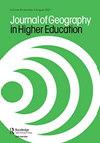The use of “writing retreats” in supporting geography and environmental science undergraduate independent research projects
IF 1.8
4区 教育学
Q2 EDUCATION & EDUCATIONAL RESEARCH
引用次数: 1
Abstract
ABSTRACT Twenty-first century graduates need to have the aptitude to be critical thinkers and capacity to make balanced judgements. The undergraduate dissertation (capstone/independent research project) is normally undertaken at the end of the degree programme enabling students to demonstrate their ability to apply, analysis, synthesis and evaluate their knowledge. Despite the pedagogical importance of the dissertation and the implication of them for the undergraduate student experience, much of the literature on dissertations focuses on: design, structure and implementation; teaching and learning strategies; assessment criteria and marking standards; and, students’ development of subject-specific skills, personal attributes and transferable skills. However, the question remains how best to support and motivate undergraduate students in the final stages of the dissertation “write-up” process. This paper investigates and assesses the use of “writing retreats” within the final stages of the undergraduate dissertation process. Despite the benefits of writing retreats, they have to date typically only been offered to academic and research staff and postgraduate research students but not undergraduate students. This paper demonstrates that writing retreats are a feasible intervention tool that facilitates attitudinal changes, such as enhanced motivation, increased confidence and a more positive outlook on the final writing process of their independent research projects.“写作务虚会”在支持地理与环境科学本科独立研究项目中的应用
21世纪的毕业生需要具备批判性思考者的天赋和做出平衡判断的能力。本科学位论文(毕业论文/独立研究项目)通常在学位课程结束时进行,使学生能够展示他们应用、分析、综合和评估知识的能力。尽管学位论文的教学重要性及其对本科生经历的影响,但许多关于学位论文的文献都集中在:设计,结构和实施;教与学策略;考核标准和评分标准;学生的专业技能、个人属性和可转移技能的发展。然而,问题仍然是如何在论文“写作”过程的最后阶段最好地支持和激励本科生。本文调查和评估使用“写作务虚会”在本科论文过程的最后阶段。尽管写作静修有很多好处,但迄今为止,它们通常只提供给学术和研究人员以及研究生,而不是本科生。本文证明写作静修是一种可行的干预工具,可以促进态度的改变,如增强动机,增加信心和更积极地看待他们独立研究项目的最终写作过程。
本文章由计算机程序翻译,如有差异,请以英文原文为准。
求助全文
约1分钟内获得全文
求助全文
来源期刊

Journal of Geography in Higher Education
Multiple-
CiteScore
5.80
自引率
9.50%
发文量
29
期刊介绍:
The Journal of Geography in Higher Education ( JGHE) was founded upon the conviction that the development of learning and teaching was vitally important to higher education. It is committed to promote, enhance and share geography learning and teaching in all institutions of higher education throughout the world, and provides a forum for geographers and others, regardless of their specialisms, to discuss common educational interests, to present the results of educational research, and to advocate new ideas.
 求助内容:
求助内容: 应助结果提醒方式:
应助结果提醒方式:


